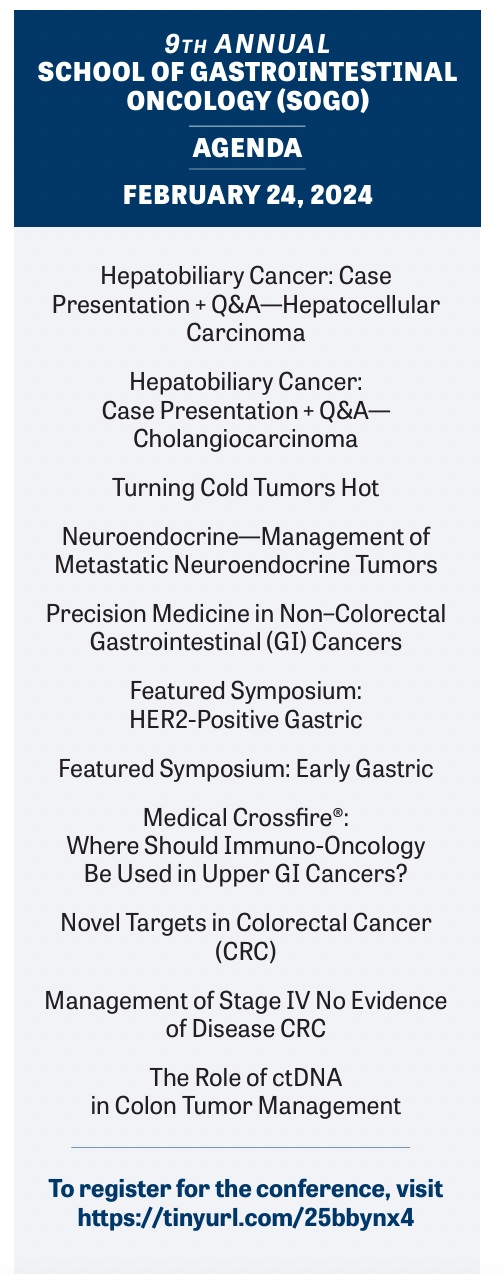Turning Up the Heat on “Immune-Cold” GI Tumors
The latest advances regarding local and systemic regulatory mechanisms of immune responses in cold and hot tumors will be an important topic explored during the 9th Annual School of Gastrointestinal Oncology.
E. Gabriela Chiorean, MD
Professor Division of Hematology-Oncology
University of Washington
Clinical Research Division
Fred Hutchinson Cancer Center
Seattle, WA

An important clinical theme that will be explored during the 9th Annual School of Gastrointestinal Oncology (SOGO®) is the challenge of turning immune-cold solid tumors into hot, responsive tumors. The “Turning Cold Tumors Hot” discussion will explore the mechanisms of this transition. The use of tumor immunotyping can provide significant insights into designing effective therapeutic strategies against cancer. The latest advances regarding local and systemic regulatory mechanisms of immune responses in cold and hot tumors will be an important topic explored during SOGO.
“A key question is: How do we manage these tumors that don’t typically respond to immunotherapies? How do we make them respond?” asked E. Gabriela Chiorean, MD, professor, University of Washington and director, gastrointestinal oncology in the Clinical Research Division, at the Fred Hutchinson Cancer Center in Seattle, Washington, during an interview with Targeted Therapies in Oncology before the conference. “I think this is of significant interest to the GI community.”
Chiorean, along with John L. Marshall, MD, chief, hematology and oncology, professor of medicine and oncology, and the director, Otto J Ruesch Center for the Cure of Gastrointestinal Cancers at Georgetown Lombardi Comprehensive Cancer Center, in Washington, DC, serves as cochair of the conference.
Another theme will be a focus on precision medicine approaches, continued Chiorean. “We are seeing KRAS-targeted therapeutics entering clinical trials and clinical practice, especially in pancreatic and colorectal cancers,” Chiorean said.
For example, findings from the CodeBreaK 100 trial (NCT03600883) and the KRYSTAL-1 trial (NCT03785249) demonstrated that KRAS G12C inhibitors sotorasib (Lumakras) and adagrasib, respectively, have activity in patients with pancreatic cancers. In CodeBreaK 100, sotorasib achieved an objective response rate (ORR) of 21% (95% CI, 10%37%) and the disease control rate of 84% (95% CI, 69%-94%). The median duration of response, a key secondary end point, was 5.7 months (95% CI, 1.6-not evaluable). The median progression-free survival (PFS) was 4.0 months (95% CI, 2.8-5.6), and the median overall survival (OS) was 6.9 months (95% CI, 5.0-9.1).1 In KRYSTAL-1, ORR was 33% in pancreatic cancer, and the median PFS was 7.4 months.2

Case Studies and Didactic Approaches
The use of case studies and didactic presentations is an effective way to keep attendees engaged with content that emphasizes the multidisciplinary approach to delivering care.
“Case studies are something that engages the audience, and didactics touch on the newest aspects of care,” said Chiorean. “The depth of these sessions will be of significant interest to clinicians to optimize treatment decisions for our patients.”
Chiorean said she was looking forward to hearing presentations by Marwan G. Fakih, MD, professor, Department of Medical Oncology & Therapeutics Research, and associate director for clinical sciences at City of Hope in Duarte, California, on the management of stage IV CRC with no evidence of disease, and Sidharth Anand, MD, MBA, a medical oncologist at UCLA Health in California, who is discussing the role of circulating tumor DNA in colon cancer management.
HER2-Targeted Therapies
In January 2023, the FDA approved the combination of tucatinib (Tukysa) and trastuzumab (Herceptin) for people with unresectable or metastatic RAS wild-type, HER2-positive colorectal cancer who have received prior treatment with fluoropyrimidine, oxaliplatin, and irinotecan.2
The approval was based on findings from the MOUNTAINEER trial (NCT03043313) whose primary end point was overall response rate and secondary end point duration of response.3
In addition, there is also growing evidence that HER2-directed therapies in biliary tract cancers could be a viable treatment option for consideration.4
Tucatinib plus trastuzumab or the HER2 bispecific antibody zanidatamab both confer response rates over 40% and PFS of approximately 5.5 months for HER2- positive biliary cancers.5
“I have made sure that all my patients with colorectal and biliary tract cancers undergo HER2 testing because of access to HER2-targeted therapies,” Chiorean said.
In the HER2-negative space, clinicians now have the option of pembrolizumab (Keytruda) in patients with advanced gastric or gastroesophageal cancer.6 For this approval, efficacy rates from KEYNOTE-859 (NCT03675737) were evaluated.
The trial randomly assigned 1579 patients to receive pembrolizumab (200 mg) or placebo with investigator’s choice of chemotherapy, which could be either cisplatin 80 mg/m2 plus 5-fluorouracil 800 mg/m2/ day for 5 days (FP) or oxaliplatin 130 mg/m2 on day 1 plus capecitabine 1000 mg/m2 twice a day for 14 days (CAPOX) of each 21-day cycle.7,8
Investigators reported significant and clinically meaningful improvement in OS and a manageable toxicity profile in the treatment arm compared with the control arm, suggesting a benefit for pembrolizumab and chemotherapy’s use in the first line in HER2-negative gastric or gastroesophageal junction adenocarcinoma.6
Looking Forward
In 2024, Chiorean said she is looking forward to hearing more about KRAS and pan-RAS inhibitors, cancer vaccines, and oncolytic virus therapies. “These are exciting agents and their use in combination with immune checkpoint inhibitors and even chemotherapy will hopefully lead to positive results,” Chiorean said.
REFERENCES
1. Strickler JH, Satake H, George TJ, et al. Sotorasib in KRAS p.G12C-Mutated Advanced Pancreatic Cancer. N Engl J Med. 2023;388(1):33-43. doi:10.1056/NEJMoa2208470
2. Bekaii-Saab TS, Yaeger R, Spira AI, Pelster MS, Sabari JK, Hafez N, Barve M, Velastegui K, Yan X, Shetty A, Der-Torossian H, Pant S. Adagrasib in Advanced Solid Tumors Harboring a KRAS G12C Mutation. J Clin Oncol. 2023;41(25):40974106. doi: 10.1200/JCO.23.00434.
3. Seagen announces FDA accelerated approval of Tukysa (tucatinib) in combination with trastuzumab for people with previously treated RAS wild-type, HER2-positive metastatic colorectal cancer. News release. January 19, 2023. Accessed December 6, 2023. http://bit.ly/3IWR7o9
4. Strickler JH, Cercek A, Siena S, et al. Tucatinib plus trastuzumab for chemotherapy-refractory, HER2-positive, RAS wild-type unresectable or metastatic colorectal cancer (MOUNTAINEER): a multicentre, open-label, phase 2 study. Lancet Oncol. 2023;24(5):496-508. doi:10.1016/S14702045(23)00150-X
5. Nakamura Y, Mizuno N, Sunakawa Y, et al. Tucatinib and trastuzumab for previously treated HER2-positive metastatic biliary tract cancer (SGNTUC-019): a phase 2 basket study. J Clin Oncol. 2023;41(suppl 16):4007-4007. doi: 10.1200/ JCO.2023.41.16_suppl.4007
6. Ayasun R, Ozer M, Sahin I. The role of HER2 status in the biliary tract cancers. Cancers (Basel). 2023;15(9):2628. doi:10.3390/cancers15092628
7. FDA approves pembrolizumab with chemotherapy for HER2-negative gastric or gastroesophageal junction adenocarcinoma. News release. November 16, 2023. Accessed December 6, 2023. https://tinyurl.com/4eh7nbvr
8. Rha SY, Oh DY, Yañez P, et al. Pembrolizumab plus chemotherapy versus placebo plus chemotherapy for HER2-negative advanced gastric cancer (KEYNOTE-859): a multicentre, randomised, double-blind, phase 3 trial. Lancet Oncol. 2023;24(11):1181-1195. doi:10.1016/S1470-2045(23)00515-6
